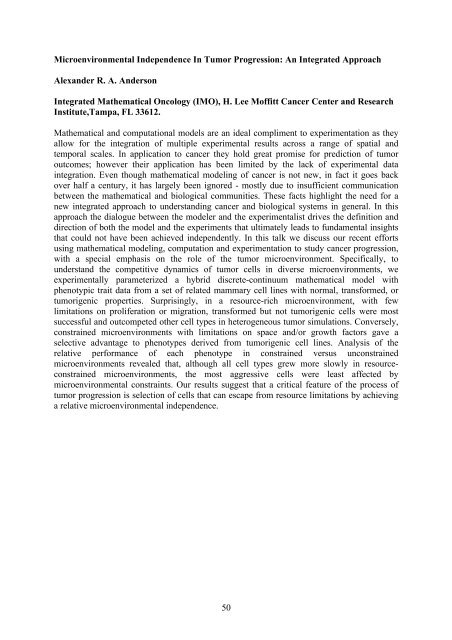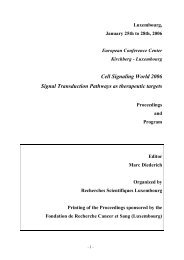Abstract book (download .pdf file) - Redox and Inflammation ...
Abstract book (download .pdf file) - Redox and Inflammation ...
Abstract book (download .pdf file) - Redox and Inflammation ...
You also want an ePaper? Increase the reach of your titles
YUMPU automatically turns print PDFs into web optimized ePapers that Google loves.
Microenvironmental Independence In Tumor Progression: An Integrated Approach<br />
Alex<strong>and</strong>er R. A. Anderson<br />
Integrated Mathematical Oncology (IMO), H. Lee Moffitt Cancer Center <strong>and</strong> Research<br />
Institute,Tampa, FL 33612.<br />
Mathematical <strong>and</strong> computational models are an ideal compliment to experimentation as they<br />
allow for the integration of multiple experimental results across a range of spatial <strong>and</strong><br />
temporal scales. In application to cancer they hold great promise for prediction of tumor<br />
outcomes; however their application has been limited by the lack of experimental data<br />
integration. Even though mathematical modeling of cancer is not new, in fact it goes back<br />
over half a century, it has largely been ignored - mostly due to insufficient communication<br />
between the mathematical <strong>and</strong> biological communities. These facts highlight the need for a<br />
new integrated approach to underst<strong>and</strong>ing cancer <strong>and</strong> biological systems in general. In this<br />
approach the dialogue between the modeler <strong>and</strong> the experimentalist drives the definition <strong>and</strong><br />
direction of both the model <strong>and</strong> the experiments that ultimately leads to fundamental insights<br />
that could not have been achieved independently. In this talk we discuss our recent efforts<br />
using mathematical modeling, computation <strong>and</strong> experimentation to study cancer progression,<br />
with a special emphasis on the role of the tumor microenvironment. Specifically, to<br />
underst<strong>and</strong> the competitive dynamics of tumor cells in diverse microenvironments, we<br />
experimentally parameterized a hybrid discrete-continuum mathematical model with<br />
phenotypic trait data from a set of related mammary cell lines with normal, transformed, or<br />
tumorigenic properties. Surprisingly, in a resource-rich microenvironment, with few<br />
limitations on proliferation or migration, transformed but not tumorigenic cells were most<br />
successful <strong>and</strong> outcompeted other cell types in heterogeneous tumor simulations. Conversely,<br />
constrained microenvironments with limitations on space <strong>and</strong>/or growth factors gave a<br />
selective advantage to phenotypes derived from tumorigenic cell lines. Analysis of the<br />
relative performance of each phenotype in constrained versus unconstrained<br />
microenvironments revealed that, although all cell types grew more slowly in resourceconstrained<br />
microenvironments, the most aggressive cells were least affected by<br />
microenvironmental constraints. Our results suggest that a critical feature of the process of<br />
tumor progression is selection of cells that can escape from resource limitations by achieving<br />
a relative microenvironmental independence.<br />
50




